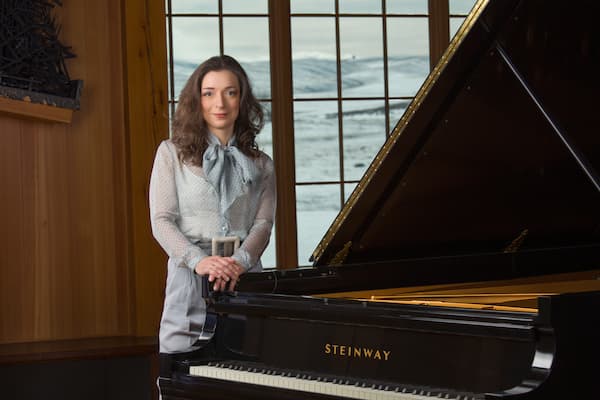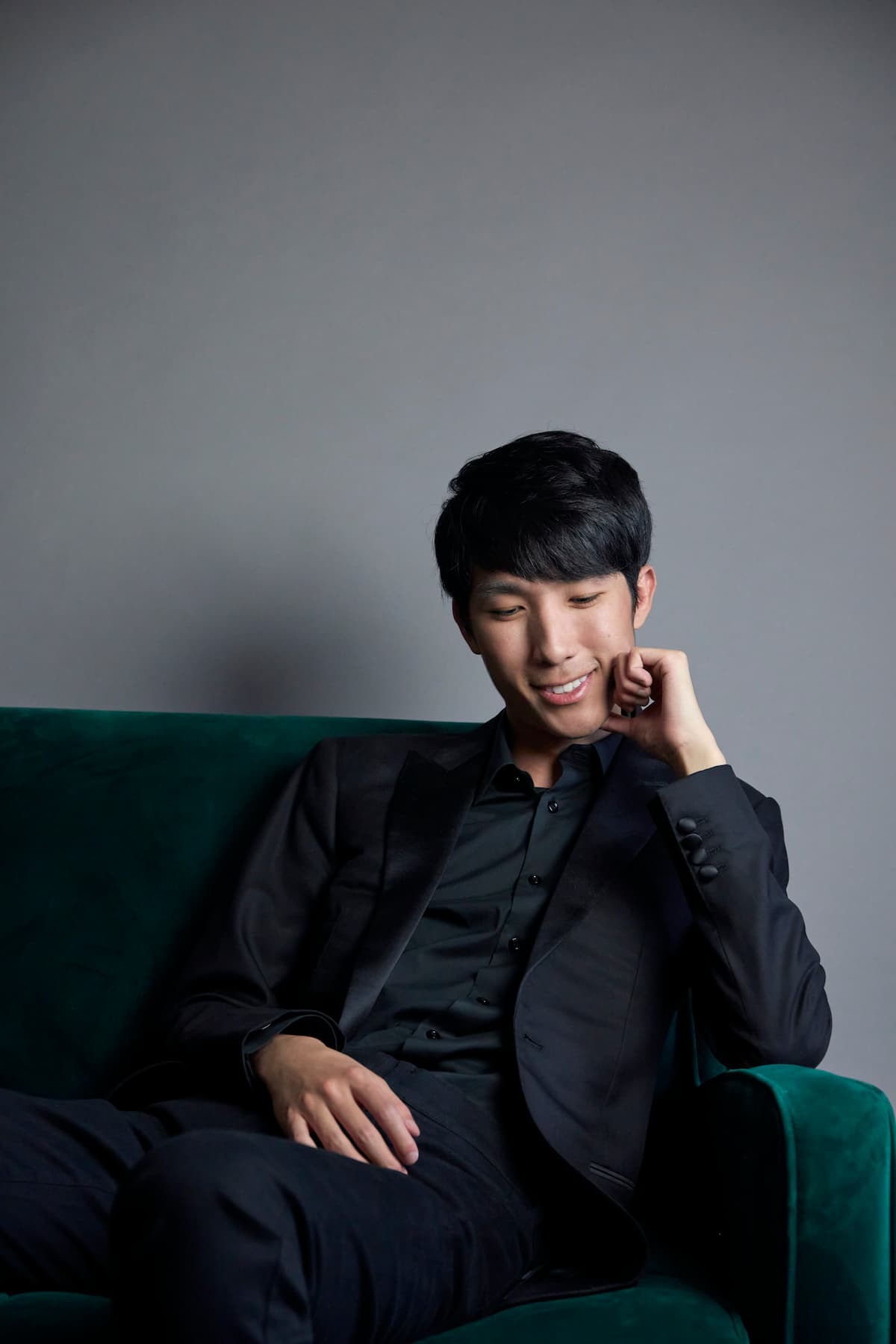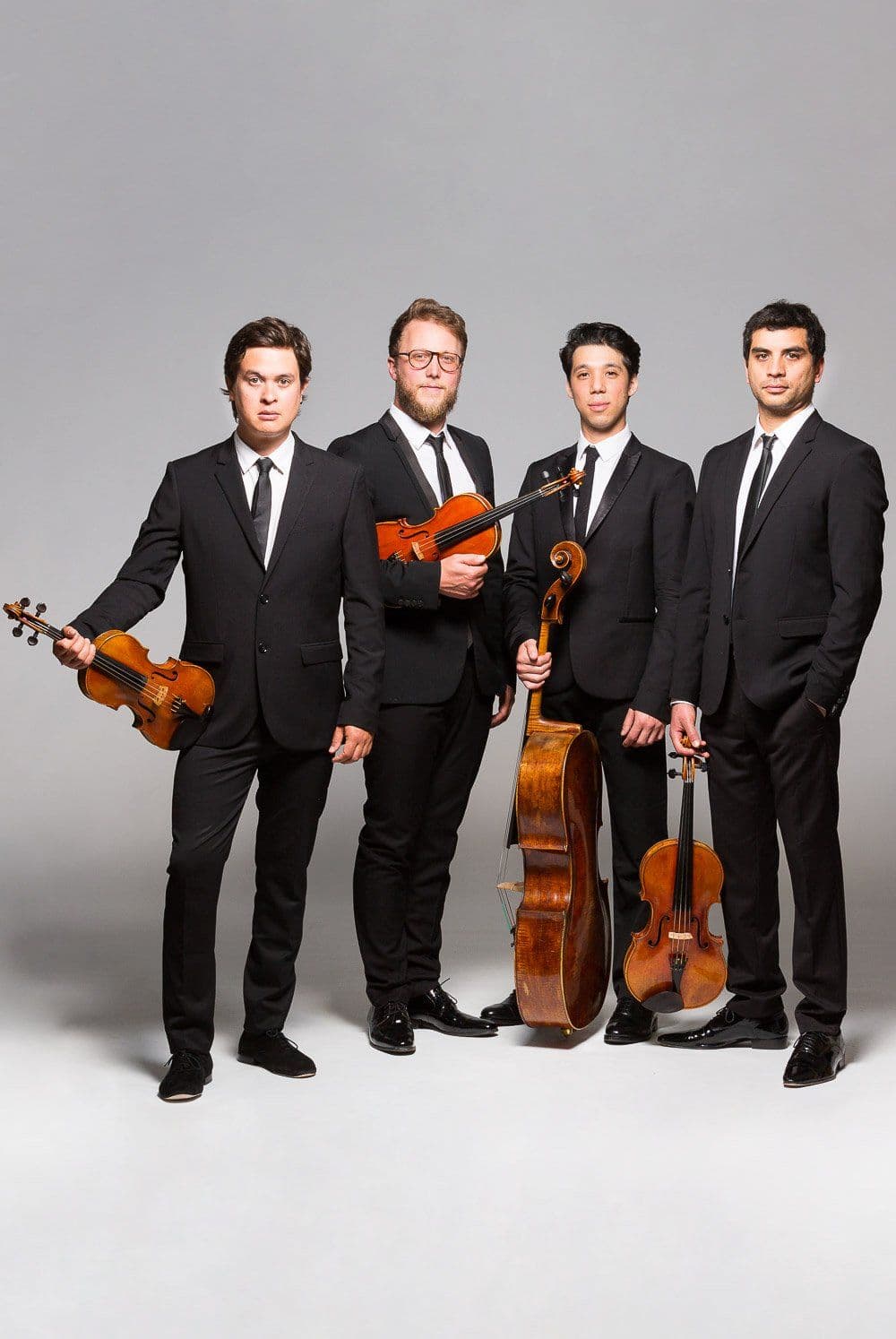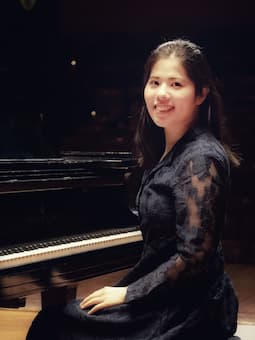
Leona Cheung
For this month, I would like to shift your focus towards one of the unsung heroes of music making that are vital in concerts — collaborative pianists.
As a Boston-based professional collaborative pianist, Leona Cheung is an acclaimed musician who I met during my college years at Hong Kong Baptist University (HKBU). Standing next to each other in the choir, we have had a concert tour to Australia together.
Now Leona has become a specialist in the vocal chamber repertoire. Over the years, she has performed in many international Art Song Festivals across Canada and Europe, such as Toronto Summer Music Festival, Oxford Lieder Festival, Leeds Lieder Festival, and Franz Schubert Institut. More importantly, Leona has collaborated with many world-renowned musicians and organizations, including the Grammy-nominated choir Seraphic Fire, the Grammy-winning ensemble Handel and Haydn Society, as well as prominent conductors Helmuth Rilling and Patrick Dupré Quigley. Graduated from HKBU majoring in Piano Performance, she holds a Master of Music degree and a Graduate Diploma in Collaborative Piano from the New England Conservatory (NEC).
Hi Leona, can you tell us about your career and recent projects as a collaborative pianist? Especially since you’ve graduated from HKBU?

Leona Cheung and Helmuth Rilling with Hong Kong Singfest
I have had some wonderful experiences both in Hong Kong and outside as a collaborative pianist. After I got my degree from HKBU, I was invited by Hong Kong Singfest to work with Grammy Award-winning German conductor Helmuth Rilling to prepare for his concerts in Hong Kong. The programs included a number of large choral-orchestral works by Bach, Mozart, and Haydn.
In 2016, I decided to further my education — earned my Master degree in 2018 and a Graduate Diploma in 2020, both from NEC. Since then, I have been working full-time in the Boston area, performing with singers in recitals. I am the choral pianist for groups such as the Handel and Haydn Society and Boston Children’s Chorus. I am on staff with NEC and Boston Conservatory as well, coaching rehearsals, voice lessons, and repertoire classes. This summer, I will be excited to join the Professional Choral Institute at the Aspen Music Festival as a Collaborative Pianist with the Grammy-nominated choral ensemble, Seraphic Fire.
What is the biggest difference between a solo pianist and a collaborative pianist?
Both solo pianists and collaborative pianists demand excellent piano technique and a lot of hard work. Despite this, there are some skill sets that differ. For solo pianists, most of their time and effort may be spent on perfecting the very last details of a piece or memorizing the entire concert program.
Collaborative pianists spend more time rehearsing with our collaborators, discussing the artistic vision altogether; it is also paramount for collaborative pianists to always actively listen and pay attention to what our collaborators are doing in the present moment. For me, I like my job: It is more fun to collaborate with friends, so that we keep inspiring each other in the musical dialogue.
When you go to a vocal chamber concert such as a singer’s recital, the importance of collaborative pianist is often overlooked. Throughout rehearsals to the final performance, we form an equal musical partnership with our collaborators. While it is our job to support the singers as the stars of the center stage, you cannot underestimate the importance of collaborative pianists in the final artistic vision. We are the unsung heroes of music making!
What is the highlight in your career at this point?
I have premiered several pieces with Cantoria Hong Kong in the recording for Half Moon Rising, a Chinese Choral Music Anthology. I also assisted the editor-in-chief John Winzenburg in the score and text preparation of this anthology, as we published it through Edition Peters. While Chinese choral music has developed a rich repertoire over the past century, it has been my hope to make these beautiful pieces available and accessible to non-Chinese choirs around the world. So this collection was not only the first-of-its-kind to be published internationally, but also representing one of the first efforts to expand to Asian contemporary music by Edition Peters, the renowned international music publisher.
What are your future plans as a collaborative pianist?
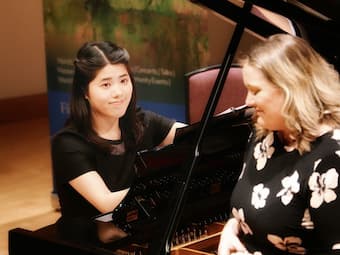
Leona Cheung and Cara Bender
I am establishing myself as an expert in collaborative piano and a coach specializing in vocal repertoire. In the upcoming years, I hope that I will explore more song projects while touring recitals with singers. Recently, I am developing a concert program to raise the awareness of Asian-American immigrants in America, with music that resonates their feelings of being in their home country. I also hope to spark further interest in song repertoire by female composers. I believe that music and poetry help us understand human perception to appreciate the world around us. In the near future, I would like to become a répétiteur in opera companies, accompanying opera rehearsals and coaching singers; I would also like to be a conductor.
Leona Cheung and Cara Bender Perform Samuel Barber’s Four Songs Op.13
Leona Cheung and John Winzenburg with Cantoria Hong Kong Perform Kai-Young Chan 水調歌頭 (Under the MidAutumn Moon)
What are your favorite pieces that you always love playing?
It is so hard to choose! I favor Art Song repertoire, which emphasizes and fosters the intimate musical dialogue between two artists: the singer and the pianist. This allows them to walk through the musical journey together on stage. For example, songs by Gustav Mahler, Samuel Barber, Clara Schumann, and Benjamin Britten are always a joy to explore. When I rehearse, I love to discover the gems in music — the connections between how poetry and music link to one another. Also, music is a universal language that can convey messages to the audience. When the poetry is delivered with the utmost expressions together with the musical performance, the audience will understand it more thoroughly. To me, it is absolutely beautiful to connect people with music.
For more of the best in classical music, sign up to our E-Newsletter
Leona Cheung and Cara Bender Perform Gustav Mahler’s “Liebst du um Schönheit” from Rückert-Lieder

